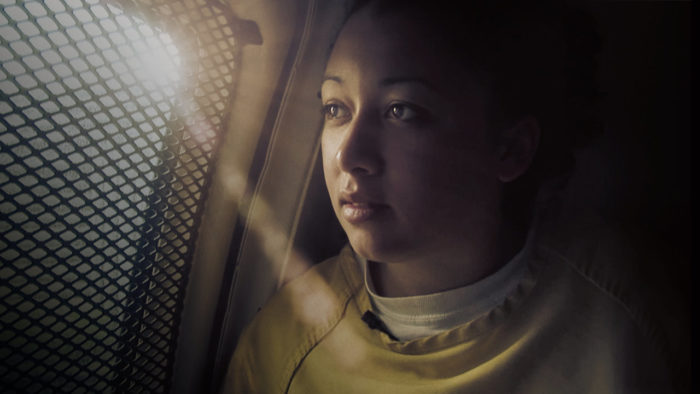True Crime Tuesdays: Murder to Mercy: The Cyntoia Brown Story
Review Overview
Nuance
4Access
5Analysis
4Helen Archer | On 05, May 2020
Every Tuesday, our resident true crime obsessive gets their fix with a documentary film or series. We call it True Crime Tuesdays.
In 2004, 16-year-old Cyntoia Brown was arrested and put on trial for the murder of Johnny Michael Allen, a 43-year-old estate agent who had picked her up from the side of the road in Nashville’s red light district and taken her to his home in order to have sex with her. She was found guilty and sentenced to 51 years in prison. Director Daniel Birman shot footage of her in the week of her arrest, and for a further six years, which was eventually screened in his 2011 PBS documentary Me Facing Life: Cyntoia’s Story. This Netflix original is a follow-up to that film.
Cyntoia’s story became worldwide knowledge in 2017, after a mass twitter campaign, pushed by celebrities including Rihanna and Kim Kardashian, urged the Nashville prison system to #FreeCyntoia. At the height of the #metoo movement, it seemed inconceivable that someone so young, who would now be identified as the victim of sex trafficking, could be imprisoned in an adult jail for decades in such circumstances. But it is worth noting from the outset that Murder to Mercy is an unauthorised documentary in which Cyntoia herself had no input. In now-deleted tweets, she said: “While I was still incarcerated, a producer who has old footage of me made a deal with Netflix for an unauthorized documentary, set to be released soon. My husband and I were as surprised as everyone else when we first heard the news because we did not participate in any way… I am currently in the process of sharing my story, in the right way, in full detail, and in a way that depicts and respects the woman I am today. While I pray that this film highlights things wrong in our justice system, I had nothing to do with this documentary.”
The one-off, 96-minute film is formatted in a strictly chronological order, with date stamps popping up regularly to tell us we’ve skipped a year or two. It starts with Cyntoia’s original arrest, and there is some footage of her on the phone to her adoptive mother, Ellenette Brown, as well as some face-to-face interviews, in which she comes across as very young and very traumatised. As the years go by and the access to Cyntoia herself becomes less frequent, white voices proliferate, with Birman focusing on the lawyers and advocates who are trying to free her, filming them in the courtrooms as they put forward their appeals. He also interviews her birth mother, Georgina Mitchell, and maternal grandmother, Joan Warren, who speak towards a cycle of abuse in a matter-of-fact, brutally honest manner. Joan describes the rape which led to her pregnancy with Georgina, and of her wish that she had had a hysterectomy at the age of 16, while Georgina talks about the childhood sexual abuse she suffered at the hands of a neighbour, and the ways it affected her.
Cyntoia’s voice becomes more noticeably absent as the documentary goes on. We find out that she has adjusted, over the years, to prison life, keeping out of trouble and excelling in her education. Yet during one hearing featured, she is described as having foetal alcohol syndrome, resulting in apparently irrevocable “mild mental retardation”. The brain damage outlined is certainly not apparent in her intelligent and articulate manner. The camera catches Cyntoia weeping quietly in the back of the courtroom as she hears herself described in this way, her pain apparent. As an attempt to have her sentence reduced, it seems questionable, and it ultimately failed – but it would be good to hear Cyntoia’s thoughts on the strategy.
Similarly, we hear practically nothing from her adoptive mother – the one constant presence throughout Cyntoia’s life, and someone who might have been able to give some background details regarding her teenage years. There is also no investigation into the involvement of the man who sent her out that fateful night – a pimp nicknamed “Cut Throat”, who trafficked her to other men for sex. The omission of such important backstory only serves to cast the 16-year-old Cyntoia as someone with more agency than she realistically had.
Murder to Mercy ultimately portrays Cyntoia’s story as an individual story of redemption – Cyntoia worked so hard and is such an exceptional person, it is argued in her final, successful appeal, that she should be released. That there is barely a mention of the wider systemic failures and racial injustices within the prison system is all the more surprising for the fact that her work now focusses on criminal justice reform, and helping the victims of sex trafficking. While the documentary is a reasonable primer for those unfamiliar with Cyntoia’s story, it flounders when compared to the more sophisticated, nuanced true crime films we, as an audience, have become accustomed to. We can, at least, look forward to Cyntoia telling her own story, her way.
Murder to Mercy: The Cyntoia Brown Story is available on Netflix UK, as part of an £9.99 monthly subscription.



















